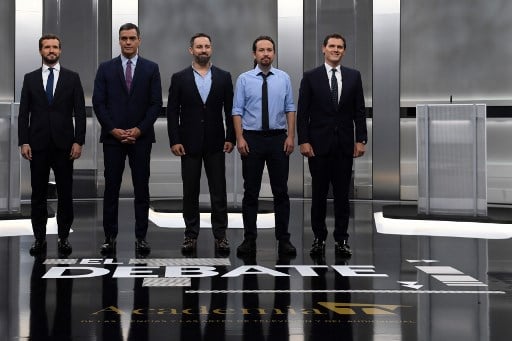Sunday's election comes after several days of violent protests in Barcelona and other Catalan cities, sparked by last month's jailing of nine Catalan separatist leaders for a failed 2017 independence bid.
Under pressure from the right, acting Prime Minister Pedro Sanchez vowed during the five-way debate to amend Spain's laws to make clear “once and for all” that staging an unsanctioned independence referendum would be a crime if his Socialists were re-elected.
Sanchez, who took office in June 2018 with the support of Catalan separatist lawmakers, came under fire from the right over his handling of the protests, which saw demonstrators set fire to cars and throw rocks, Molotov cocktails and steel balls at police.
READ MORE:
- Vox: Spain's far right party surges in polls ahead of election
- Spain's election campaign kicks off with crisis-hit Catalonia as battleground
- ANALYSIS: How the upcoming elections in Spain and UK might affect the Spanish housing market
Holding up a piece of pavement “like those that were thrown at police” in Barcelona, the leader of the centre-right party Ciudadanos, Albert Rivera, said Madrid should have restored order by suspending Catalonia's regional autonomy and dismissing the head of Catalonia separatist regional government, Quim Torra.
The leader of far-right party Vox, Santiago Abascal, went further, saying there was a “permanent coup d'etat in Catalonia” and calling for Torra to be “arrested, handcuffed and brought before the courts”.
While conservatives criticised Sanchez's handling of the Catalan crisis, the leader of far-left party Podemos, Pablo Iglesias, said it would give the Socialist leader the “perfect excuse” to strike a deal with the conservative
Popular Party (PP) to govern.
Spain is returning to the polls for its fourth election in as many years after Sanchez was unable to secure parliamentary backing to form a new government following inconclusive polls in April that saw his Socialist win just 123 seats in the 350 seat lower house of parliament.
The latest polls suggest the Socialists are leading, but could get fewer seats than in April, and neither the left-wing nor right-wing parties would win a majority.
Spain has been gripped by political instability since the December 2015 elections which saw the emergence of Ciudadanos and the far-left Podemos, ending three decades of bipartisan hegemony by the Socialists and the PP.




 Please whitelist us to continue reading.
Please whitelist us to continue reading.
Member comments